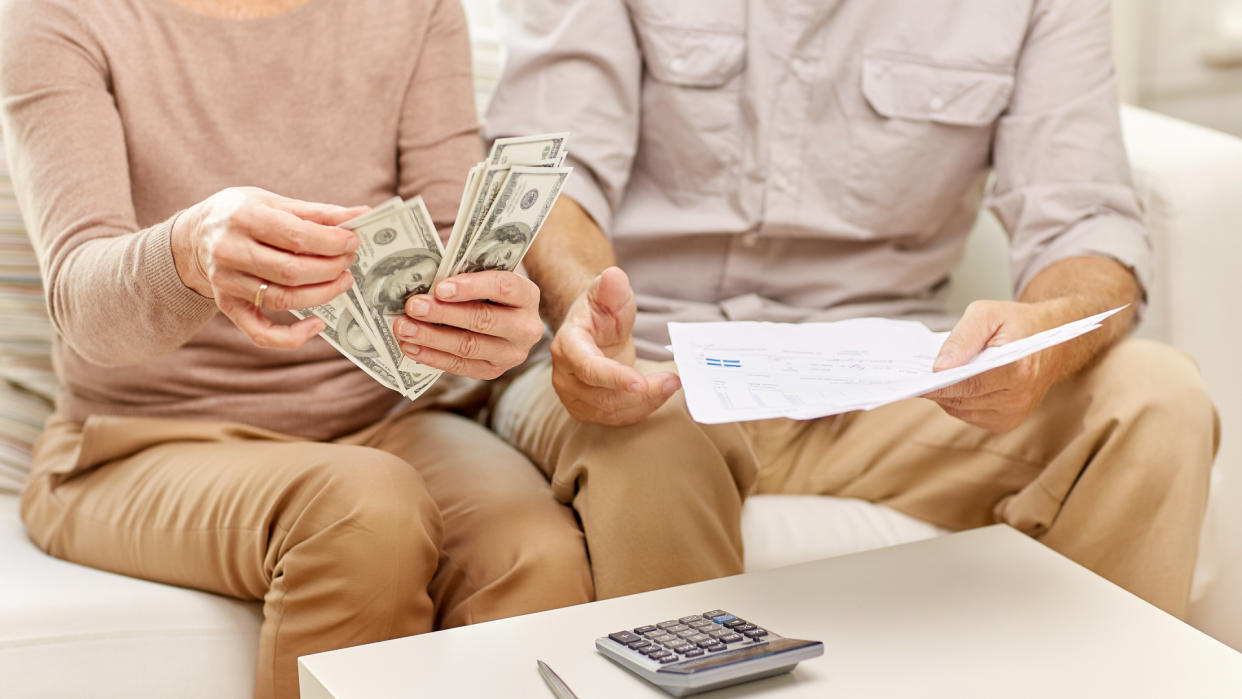How Much Cash Should Retirees Keep in the House?

Although modern retirees live in the age of tap-and-go credit cards, Apple Pay and BNPL, there’s nothing like the comfort and security of a wad of cold, hard cash.
But paper money is vulnerable in your house, where it’s prone to theft, fire and floods with no FDIC insurance to keep it safe — and it spends its entire time under your mattress losing value to inflation.
Check Out: I Retired at 65: Here’s My Monthly Budget
Read Next: Owe Money to the IRS? Most People Don’t Realize They Should Do This One Thing
Most retirees should keep some just-in-case money at home, but there’s a fine line between too much and not enough. So, where’s the sweet spot? GOBankingRates asked the experts.
So, Why Do You Need Cash at Home in 2024, Anyway?
In the age of paying with the push of a button or a quick QR code scan, why do modern retirees still risk keeping paper money locked in a safe or secreted away in a cutout hardcover book?
Rhett Stubbendeck, finance and insurance expert and CEO of Leverage Planning, said there are two primary justifications, even in 2024.
“When it comes to how much cash to keep tucked away in the cookie jar or, you know, somewhere a bit safer, here’s the lowdown from what I’ve learned and what I usually tell my retired clients,” said Stubbendeck.
Trending Now: 7 Bills You Never Have To Pay When You Retire
The first reason is having emergency cash, which anyone, retired or not, needs in a pinch — or a crisis — on hand when you need it without an ATM visit.
“I’m all for being prepared,” said Stubbendeck. “Keeping enough cash at home to get through a week or two is a smart move.”
The second reason is what he calls “walking around money.”
“It’s also handy to have a little cash on you for those small day-to-day things, like tipping the delivery person or grabbing a coffee from that place around the corner that doesn’t take cards,” said Stubbendeck. “But we’re not talking big bucks here, just a bit to keep things smooth.”
Finding the Intersection Between ‘Big Bucks’ and ‘Keeping Things Smooth’
Retirees must find their ideal dollar amount to ensure they’re not hoarding too much cash they could be investing instead, but not keeping too little to manage unexpected crises.
“I’ve helped countless individuals navigate the complexities of financial security and risk management,” said insurance and finance expert John Crist, founder of Prestizia Insurance. “When it comes to retirees keeping cash in their homes, the principle of balancing accessibility with security is paramount.”
While everyone’s number is unique, Crist has seen a healthy range develop over his 25-year career.
“Based on my experience, retirees should keep a modest amount of cash at home — enough to cover urgent or unexpected expenses over a few days,” said Crist. “This typically ranges between $300 to $1,000. The exact amount depends on their comfort level and specific circumstances. However, it’s crucial to remember that keeping large sums of cash at home is not advisable due to theft, fire, or loss risks.”
$1,000 Is Probably a Good Ceiling, but $300 Might Be Too Low of a Floor
Jenna Trigg, who co-founded Silver Fox Secure with her father to help combat vulnerable population financial exploitation, generally agrees with Crist’s assessment — but she’d like to see most retirees set their minimum a little higher than $300.
“I recommend retirees keep a reserve of around $500 to $1,000 cash in their homes,” said Trigg. “This amount strikes a balance between having accessibility in emergencies without attracting undue risk.”
Seniors Face a Unique Danger if Word of Their Stash Gets Out
The dangers of keeping too much cash at home aren’t limited to inflation, missed investment opportunities and fire risks. As an unfortunate side effect of her work, Trigg has seen older people put bullseyes on their backs by keeping too much cash around the house.
“Our work with seniors has shown that being targeted for financial scams or theft often stems from perpetrators knowing there are significant amounts of money kept at home,” said Trigg. “Therefore, keeping cash reserves to a minimum and securing them in a theft-proof and fire-resistant safe is crucial. This ensures the money is there when needed, such as for unforeseen personal emergencies or in instances where digital payment platforms or credit systems fail, but it also mitigates the risk of becoming a target for financial crimes.”
At Home, in the Bank and Online, Protect Yourself and Your Money
As Trigg points out, retirees are especially vulnerable to financial exploitation, so they must take extra care in securing their money no matter what form it takes.
“Our experience has highlighted the importance of coupling in-home cash reserves with robust identity theft protection and credit monitoring solutions,” said Trigg. “This approach not only secures the physical cash but also safeguards the individual’s broader financial assets and personal information from digital exploitation. Given the intricate nature of financial risks today, protecting one’s financial integrity requires a multi-faceted strategy. Keeping a sensible cash reserve at home is a part of this, but it should be complemented with comprehensive monitoring and protection services to cover all bases of potential financial exploitation.”
More From GOBankingRates
This article originally appeared on GOBankingRates.com: How Much Cash Should Retirees Keep in the House?
